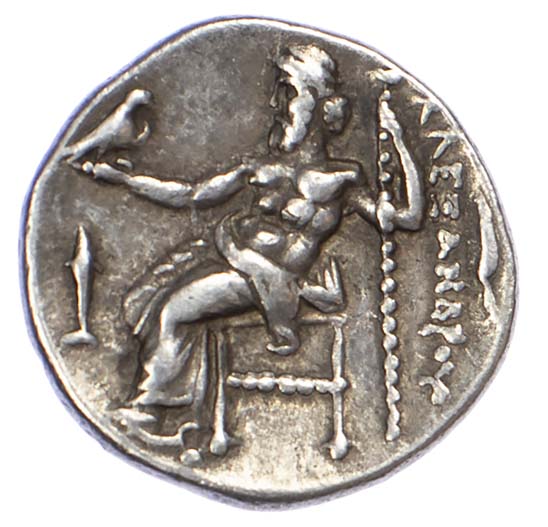Posted on 09/27/2022 8:50:05 AM PDT by SunkenCiv
Archaeological sensation on Papuk. A Greek silver coin from the end of the 4th century BC was found at an archaeological site near Kaptol. The story doesn't stop there - it's only starting to come together. What wealth and power did the people who lived in this area have, and how long did it last?
As RTL reports, a Greek silver coin from the 4th century BC was found after the rain along the forest road on Papuk. It was carved with a depiction of Zeus enthroned with a bird, and on the other side is a depiction of Alexander the Great. Random passers-by found it. They saw pottery and pieces of vessels.
The locality near Kaptol is a well-known archaeological site with the graves of the warrior aristocracy, where prestigious weapons and equipment were found in Europe in the 7th century BC.
This means that the community that lived here had a major significance on the border of three worlds - the Mediterranean, Central Europe and the Danube.
At the Lisičja Jama locality, named after the ceramics that the foxes end up dislocating while digging their dens, archaeologists are excavating a settlement where it is assumed that 500 people lived. Numerous inventions prove this...
The coin from the 4th century BC is crucial because it shows that the power of these people from Papuk, who lived at the intersection of cultures and trade routes, did not last for a short time but continuously for centuries...
(Excerpt) Read more at total-croatia-news.com ...
What a Kaptol find!...............................
If I’d found a coin like this, I’d have flipped!

The text reads Alexandrou (of Alexander).
Heads or tails?........................
So this was a coin struck by the Kingdom of Macedonia?
Notice the use of the word ‘carved’.
Does the date on it have “BC” after it?
Is it stamped “347 BC”?
(Yes, I am being sarcastic.)
Apparently the Kingdom of Macedonia continued to issue coins with “Alexandrou” on them until about 280 B.C., but the Seleucid and Ptolemaic successor states also issued coins reading “Alexandrou” until 306 or 305 B.C. (when Seleucus I and Ptolemy I began to call themselves kings).
It better! Otherwise, gotta be fake! ;^)
Personally, I’d be inclined to describe this coin as an ‘erratic’, similar to the big boulders found where there is no clear source of origin. In the pre-modern world, precious metal / bullion objects or coins were a universal currency regardless of the issuing entity.
In colonial and later times here in this country, a common denomination used in commerce was ‘Pieces of Eight’ which were a Spanish Real that was split into eight pieces. This usage remains part of our language whenever a quarter dollar is slang-referenced as a two-bit value. bullion metals were ALWAYS valued as trading currency because they were weighed by the merchant for value rather than just a face value.
Indeed, one of the most famous men of science, Sir Isaac Newton, was instrumental in cleaning up the mess that England’s coinage had become when he was appointed by Charles II to be Warden then Master of the Royal Mint in London. His job was challenging because after the English Civil War of 1645 and centuries of adulterated coinage & counterfeit, few people trusted the actual value of any coins in circulation.
Yup. Ancient coins (particularly Roman coins, which are remarkably numerous even today) that show up in odd places (India, China, even the Americas and Australia) were probably lost by ancient merchants. The usual rather absurd claim is, the flat-broke hard-working pioneers of the past couple centuries were such avid ancient coin collectors that they carried them on their daily work, and dropped them while trapping and plowing.
The federal gub-mint merely published equivalence tables for various coinage in common circulation rather than minting money. The colonies had issued money (I’ve got a 3 cent piece from one of them around here, uh, somewhere) and during The Revolution a table showing relative values against the CC script. The Articles of Confederation apparently continued this practice. The Constitution reserves minting and currency issues to the feds. The first regular printed money didn’t arrive until 1861. Silver certificates ceased to be printed around the time I was born, and I’ve not seen one floating around in circulation (a fiver) for perhaps 30 years or so. In the 1950s silver dollars were still in circulation, at least around here in The Boonies.
https://www.mycreditunion.gov/financial-resources/history-united-states-currency
https://en.wikipedia.org/wiki/Early_American_currency
Nice, thanks!
The Romans used dies and hammered the image onto cast rounds. Not sure the Greeks didn’t (at least sometimes) cast the actual coins.
DuckDuckGo is our friend...
Disclaimer: Opinions posted on Free Republic are those of the individual posters and do not necessarily represent the opinion of Free Republic or its management. All materials posted herein are protected by copyright law and the exemption for fair use of copyrighted works.